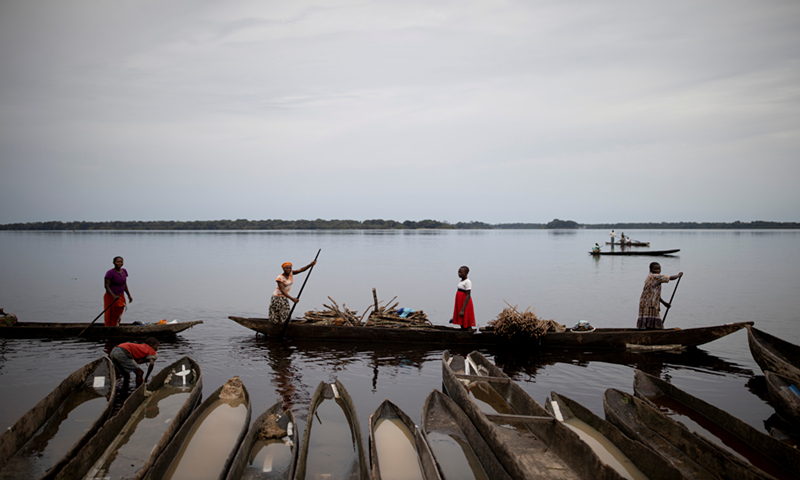China and the DR Congo strengthen bilateral ties
By Dong Feng Source: Global Times Published: 2020/9/21 18:43:40
The Global Times talks to Chinese Ambassador to the DRC Zhu Jing about how trade relations continue to improve between the two countries despite the pandemic

Fishermen paddle along the Ruki River, near the village of Bantoyi in the Democratic Republic of the Congo, April 9, 2019. Photo: VCG
Editor's Note: China and the Democratic Republic of the Congo (DRC)'s bilateral cooperation has been deepened by the countries' joint efforts to fight coronavirus. In an email to Global Times (GT), Chinese Ambassador to the Democratic Republic of the Congo (DRC) Zhu Jing, said that the epidemic situation will not last, but the long-term friendship between China and the DRC and the steady development of bilateral relations have a solid foundation for further economic and trade cooperation.
GT: The Chinese embassy has made tremendous efforts to improve the safety of the environment for Chinese-funded enterprises in the DRC, and has organized many workshops online with private companies in the DRC on epidemic prevention and control work. How do you evaluate the bilateral economic and trade cooperation between these two countries?
Zhu: China and the Democratic Republic of the Congo's economic and trade cooperation is rooted in the comprehensive China-Africa strategic partnership and the joint building of the "Belt and Road." The bilateral cooperation is focused on investment, trade and engineering contracts covering multiple fields such as mining, infrastructure, agriculture, health, communications, and logistics.
There are more than 80 Chinese companies investing in the DRC, creating nearly 50,000 jobs for residents, most of which are in the mining and smelting sectors.
The investment scale of Chinese-funded enterprises in the DRC now exceeds $10 billion, which has doubled since 2015.
The DRC has become China's fifth largest investment destination in Africa. The cooperation between the two countries in the mining sector has accelerated the rapid development of the upstream and downstream industries of the DRC, and has made remarkable contributions to the increase in residential tax, the expansion of employment, and the improvement of people's livelihoods.
As for infrastructure, the cooperation between the two countries has a long track record and has had fruitful results.
Projects such as the People's Palace and Stade des Martyrs have become symbols of friendship between the two countries.
In recent years, our two countries have cooperated on a number of new projects such as Lubumbashi General Hospital, the Zongo 2 hydroelectric power plant, telecommunication network construction for 10,000 African villages, and the DRC Agricultural Demonstration Center.
Nearly 30 Chinese-funded engineering companies in the DRC have participated in a large number of major projects, improving people's livelihoods, and have made significant contributions to the economic development of DRC and the improvement of people's living standards.
Being the DRC's largest trading partner and the largest export market for mineral products for several years now, China has seen the bilateral trade volume between China and the DRC increase by 325 times in the past 20 years.
Between 2015 and 2019, DRC exports to China increased by 70 percent and imports from China increased by 47 percent. Those exports accounted for 30 percent of the DRC's total exports, up from 25 percent in 2015.
Besides, many Chinese nationals and overseas Congolese set up businesses, purchase goods, and operate stores and supermarkets in each other's country. They are becoming envoys connecting the two countries' trade and nongovernmental exchanges.

Chinese Ambassador to Democratic Republic of the Congo Zhu Jing Photo: Courtesy of Chinese Embassy in DRC
GT: What is Chinese companies' motivation to invest in DRC?
Zhu: Chinese companies' investment in the DRC is aimed at creating mutually beneficial development with the host country. To sum up, there are three ways in which Chinese enterprises can facilitate growth.
First, they can make full use of their complementary advantages. DRC is a resource-rich country, but its economic structure is relatively simple, and its economic growth is mainly driven by the export of mineral products and agricultural products. China is a major consumer of primary products and a major manufacturing country with strong infrastructure capabilities.
The 80 Chinese-funded enterprises already invested in the DRC, working on a total of 250 projects, bring advanced production capacity and technology and are training a large number of residential laborers, and fostering the DRC's development capabilities.
Meanwhile, these companies can help fill in any gaps and overcome development bottlenecks.
The lack of infrastructure is one of the main obstacles to the development of the DRC. Among the 53 engineering projects that are under construction by Chinese-funded enterprises, 32 of them involve roads, drinking water, electricity and other infrastructure fields.
They have made great contributions to promoting residential infrastructure connectivity, and have been respected and recognized by both the local government and people.
These companies are also able to help local residents improve their livelihoods.
More than half of the projects operated by Chinese-funded enterprises are located in remote areas of the DRC with difficult living and production conditions.
Take the telecommunications network project contracted by Chinese companies for instance, allowing some of the remote villages to connect to the world through television for the first time.
There are also countless examples of Chinese companies building water conservancy projects, schools, and donating materials to local communities in the country.
After the outbreak of the novel coronavirus, Chinese-funded enterprises in the DRC worked with the Congolese government and people to fight the epidemic, actively donating money and materials, sharing epidemic prevention knowledge that could be broadcasted to local communities, distributed epidemic prevention materials to residents and built epidemic prevention infrastructure. People from both countries have offered each other mutual assistance and mutual relief in brotherhood during these difficult times. While assisting the Congolese in fighting the epidemic, Chinese-funded enterprises in the DRC have actively resumed work and production, and have also played an active role in supporting the Congolese economic recovery.
GT: How do you assess the impact of the coronavirus epidemic on the fragile economy of the DRC? Given the uncertainty of future bilateral cooperation between countries, how do you view the prospects for cooperation between China and DRC?
Zhu: The novel coronavirus epidemic has brought severe challenges to the economic and trade cooperation between China and the DRC.
In the face of the raging epidemic, China and the DRC have worked hand in hand to overcome many difficulties, focusing on both epidemic prevention and production, striving to ensure the stability of bilateral trade, of the industrial and supply chains, and minimization of the negative impacts caused by the epidemic.
As a result, China-DRC bilateral economic and trade cooperation continues to develop at a steady pace. Meanwhile The Central African Culture and Art Center project aided by the Chinese government is advancing steadily. The Kinsuka substation upgrade, the new terminal building of Ndjili Airport in Kinshasa, and the Kolwezi Vocational Training Center are also in the works. The strong recovery of the Chinese economy has injected momentum into the Congolese economy and effectively eased the downward pressure.
In the first half of 2020, bilateral trade between China and the DRC increased, with a total value of $3.11 billion, an increase of 8.2 percent year-on-year.
China's imports from the DRC reached $2.31 billion, a year-on-year increase of 20.81 percent, and its exports to the DRC reached $798 million, playing a positive role in improving the DRC's international balance of payments and stabilizing the macro economy. Such progress also reflects the resilience of China-DRC cooperation in the face of the epidemic.
The epidemic is temporary. The basic trend of long-term improvement in China-DRC economic and trade cooperation will not change in future, and the prospects remain bright. The long-term friendship between China and the DRC and the steady development of bilateral relations provide a strong political guarantee for deepening economic and trade cooperation.
China and the DRC are both important developing countries with huge potential and strong economic complementarity.
As the largest developing country, China has a super-large-scale market with technological and financial advantages. As a large African country, DRC has abundant resources and a large number of young labors, and its industrialization has just started. In the future, as the two countries continue to develop, the space for mutual cooperation and win-win cooperation will only further expand.
During the novel coronavirus epidemic, new and pragmatic opportunities for China-DRC cooperation have emerged in the fields of medical and health, infrastructure construction, infectious disease prevention, and e-commerce.
Posted in: INSIGHT